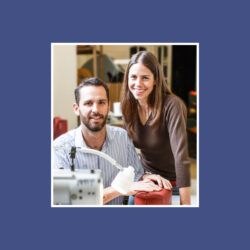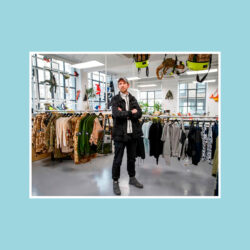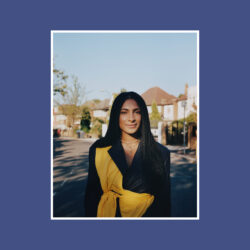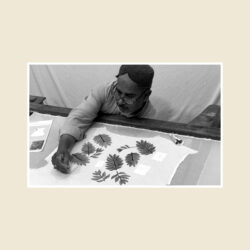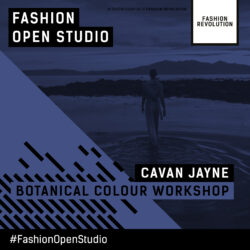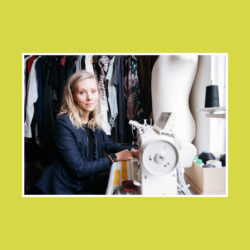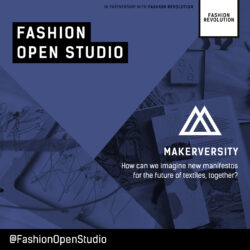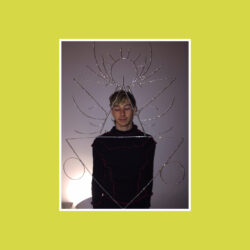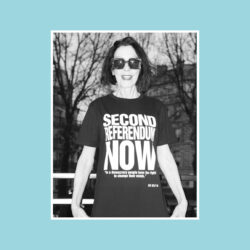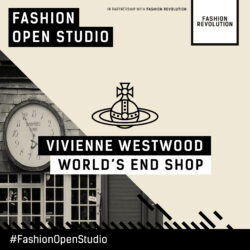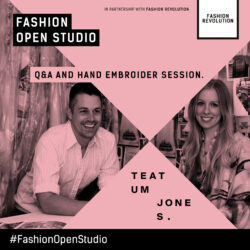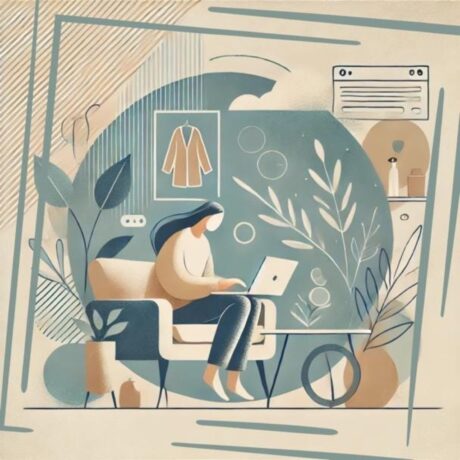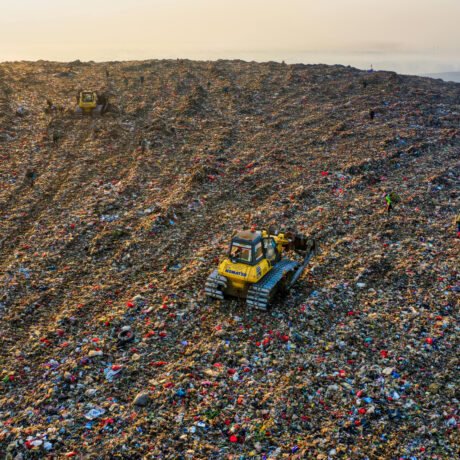5 Lessons in Sustainability from Fashion Open Studio
This year during Fashion Revolution Week more than 40 designers will participate in the Fashion Open Studio, the Fashion Revolution initiative, where designers who engage with sustainable practices open up their studios to reveal the processes behind the collections. Fashion Open Studio’s mission is to celebrate the designers who are mindfully answering the question, ‘who made my clothes?’. As we know, it’s a complex issue and there are many challenges and as many different solutions. Designers themselves hold the key to many answers; creative thinking will provide the innovations for the systemic change necessary to ensure the future success of an industry that has minimal social and environmental impact. Fashion Open Studio hopes to provide a platform for best practice and experimentation to be celebrated, encouraged and shared.
This year, Fashion Open Studio has formed a partnership with Common Objective which is creating a permanent hub for designers to exchange ideas, measure their progress and continue the conversations beyond the workshops and events of Fashion Revolution Week.
What follows are the lessons we can learn from this brilliant group of changemakers.
Lesson one: The future is upcycled and fashioned from waste.
In 2017, Fashion Open Studio launched its debut week of events, headlined by the pioneering Christopher Raeburn. Back for a third year, the Raeburn Lab in Hackney remains an open door studio all year round, but will host a tote bag making workshop from waste parachute material on Saturday, April 27th. The brand is driven by the 4 R’s principle – Remade, Reduced, Recycled, Raeburn – that has been fundamental since the label’s inception in 2010. From decommissioned parachutes to deadstock military garb, Raeburn is consistently fueled by transforming waste into new forms.
Yet Christopher Raeburn is far from the only upcycler in the Fashion Open Studio mix. Priya Ahluwalia, recipient of the 2019 H&M design award, finds her unique aesthetic in the patchworking of vintage materials into next gen sportswear. And then there is Phoebe English, who gave evidence of what is means to be a small designer in Britain today at the Environmental Audit Committee’s hearing around the sustainability of the fashion industry. The designer collects all of her offcuts from her producers and repurposes these scraps into new designs as an effort to redirect material that would otherwise head to landfill. Her Quilting from Waste workshop is an opportunity to learn a skill, meet like-minded people, and find out how English is constantly challenging herself to learn and improve.
Unique to many of these waste magicians, is that they are not only repurposing fashion waste, but the end-of-life material from other industries and sectors. This is equally true for Elvis & Kresse, the luxury brand that began life as a way of repurposing industrial fire hoses once they’ve weathered their last flame. The brand upcycles these hoses into handbags, wallets and travel bags for men and women alike, preventing the entire waste hoses of the London Fire Brigade into useful, durable product that should last a lifetime.
With too many designers to name declaring waste as the raw material of the future, the list goes on. See: Rafael Kouto, Lois Hazel & Simetrie, Duran Lantink, Turtle Doves, Rehandle and Bethany Williams.
Lesson two: Natural processes rule.
Scottish designer Cavan Jayne attributes her respect for nature to a childhood on the coast. She explains, “As the air, light and rain collide, colours and form, refract and expose the beauty nature creates. By using all natural fibres and colour pigment from various types of wood and plant, our pieces are natural in every sense of the word to manifest the beauty straight from nature”.
On Sunday, April 28th Cavan Jayne will host a botanical colour workshop, sharing how her wood- and plant-derived pigments come to life. And she isn’t the only material botanist on the Fashion Open Studio Itinerary this year. Mallika Chaudhuri’s debut brand, INDOI, will share the art of silk and cotton crushing in her London home studio, showing how you can revive unworn and stained garments or make your own crushed silk scarf.
Across the globe, Melbourne label A.BCH – the self-proclaimed TMI of transparency, is opening their studio for a natural dyeing workshop that focuses on shibori and resist stitching.
Lesson three: Technology just may save us.
On Thursday, April 25th, the Sarabande Foundation, will present an evening of lighting talks explaining the new technologies slated to shape the future of fashion consumption.
Speakers include Lorenzo Albrighi and Kuo Shih Yun the founders of Lablaco, the platform aiming to make fashion circular, alongside Hasna Kourda, founder and CEO of Save Your Wardrobe, an app that digitises the clothes we own, endeavoring to ensure that clothing is better kept track of and maintained. They will be joined by Sarabande alumni milliner Leo Carlton, who’s answer to consumption en masse is at-home 3D printing technology that uses fermented plant starch as its raw material. Leo Carlton will exhibit his latest collection and let you try out 3-D modelling at Sarabande through the week.
Other technology solutions on display across the Fashion Open Studio lineup include speculative designer Tina Gorjanc’s BioLeather workshop in collaboration with Makerversity, and live-streamed conversations from Lablaco for global audiences to take part.
Lesson four: Loved clothes last.
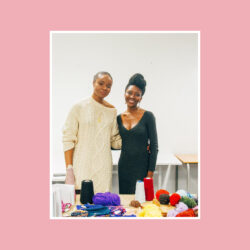
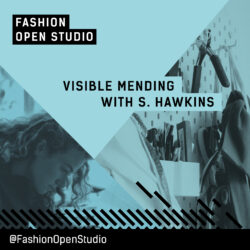
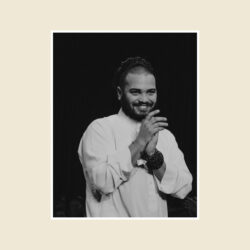
The Fashion Revolution mantra, #LovedClothesLast is heavily celebrated through the art of mending and DIY. London maker S. Hawkins is hosting a workshop on April 27th that leaves the creation of new things at the door and asks attendees to bring their weathered garments for an afternoon of visible mending. With findings from Greenpeace that show that we can reduce a garment’s carbon emissions by 24% if we keep it in our wardrobe for two years instead of one, designers who encourage mending are an important part of the climate puzzle.
In Berlin, designer collective Soup Archive request that their workshop attendees bring in a garment that will be transformed by the collective’s members before their eyes. Along a similar line, LVMH prize semi-finalist, Duran Lantink will be hosted by the innovative concept store 50M in London’s Victoria. Lantink will be showing his ‘Straight from the Sale Bins’ installation which takes inspiration from the excesses of Black Friday. He will be also launching his new bespoke Deconstructed and Reassembled upcycled collection where prospective clients can book one of ten appointment-only consultations to discuss how their no longer worn pieces can be recreated into something new and precious. These pieces will be taken back to his Amsterdam studio where he will transform them in a new model of second-life bespoke dressmaking.
Lastly on the craft and longevity thread, a weeklong Wool and the Gang popup is presented in collaboration with Katie Jones, Black Girl Knit Club, and Playwool.
Lesson five: Now, more than ever, fashion must use its political voice.
The Fashion Open Studio programme wouldn’t be complete without London’s legendary activists on the menu: Katharine Hamnett and Vivienne Westwood. April 27th, Katharine Hamnett will speak about fashion’s devastating consequences on the environment and the need for political action from a venue next door to her London Fields studio. Queen of the protest tee, Hamnett has declared, “We need radical change now, and I think the only way we’re going to get that is with legislation”.
Like Hamnett, Vivienne Westwood is as much a campaigner as a designer – using her runway for every issue from civil rights to Scottish independence, and the climate revolution. As part of Fashion Open Studio, Westwood’s original Worlds End shop will be the location for small groups to hear the stories behind the original punk DIY aesthetic which is still very much alive and kicking in the form of special one-off pieces made from waste and old stock.
Finally, a new voice in fashion’s policy conversation is Teatum Jones. The design duo made headlines when they released their SS2019 collection by way of a roundtable on Global Womanhood in place of a Catwalk show. The Teatum Jones studio invites guests to a Q+A on their creative process while participants take part in freestyle hand embroidery.
All Fashion Open Studio events are listed on our Linktree! Registration is essential. Select events will be live streamed or recorded for Fashion Revolution’s global audience. Learn more at: https://www.fashionrevolution.org/about/fashion-open-studio/




